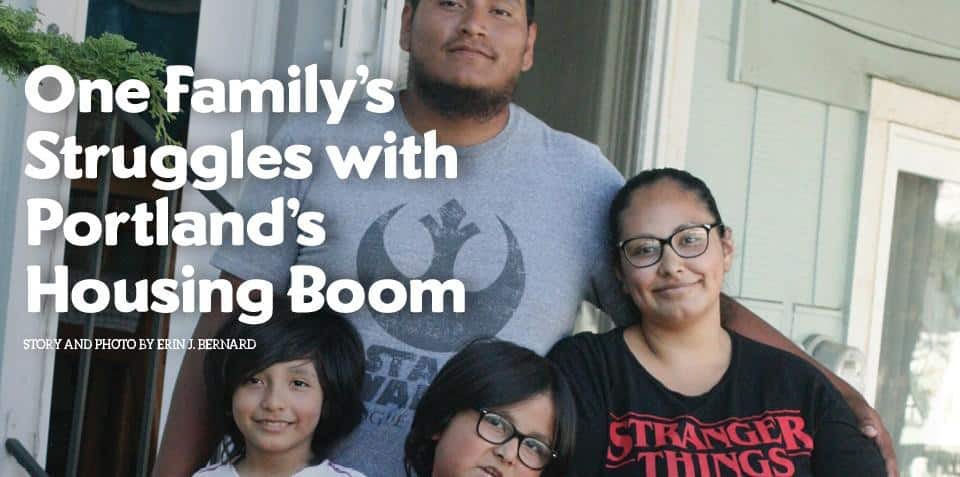
Rising rents aren’t just a Portland problem — just ask Pacific Northwest natives Melissa and Roberto Lopez.
After spending a decade immersed in the region’s housing boom, they’ve come to see development as a special kind of double-edged sword.
Roberto earns $18 an hour working construction for the high-end apartments — many of them studios and one-bedrooms — sprouting up along Portland’s skyline. The pay’s decent, the work’s steady, and it puts food on the family table.
But that same boom is also threatening to push the price of the roof over his own family’s heads nearly beyond reach. The Lopezes currently live in a one-bedroom Beaverton apartment with their four children, Debonaire, 8; Kaliq, 7; Aizza, 4; and Jazzy, 2.
Their rent just went up, and another baby girl is on the way.
This isn’t the family’s first encounter with development-but at-what-price. Before the kids came, Melissa and Roberto both worked in Bellevue, Wash.’s booming high-end construction sector.
When their eldest son was born in 2009, they returned to Melissa’s hometown of Wenatchee, Wash. full of optimism, but soon discovered that a North Central Washington tech boom had rendered the community overpopulated and overpriced.
So they moved around as their family grew, chasing better work and lower costs.
“Every time something affordable became available, people snatched it up by paying more than what was asked,” says Melissa. “That was something we financially couldn’t do.”
When plans to purchase a trailer in Wenatchee fell through in 2017, they decamped for Tigard, sleeping in a king-sized bed in Roberto’s sister’s house while they job- and apartment-hunted.
Melissa found work as a caregiver, but tensions were high, and the couple temporarily separated.
With help from the Department of Human Services, the Tigard School District, and friends and family, Melissa finally secured and furnished a small apartment in a quiet complex next to a Beaverton church and got the kids settled. The couple soon reconciled, and Roberto found steady construction work.
The money’s good, but Melissa and Roberto realize that the largesse virtually guarantees an ever-higher cost of living.
“It’s crazy how much is being built, but it’s not affordable and definitely not for families,” says Melissa. “Where are families supposed to go when the prices keep going up and there’s no money to go anywhere else?”
“The only way it makes sense to be able to afford these [costs] is if minimum wage would go up, too,” Roberto adds.
Melissa wishes landlords were held to better account for rent increases and repairs, but ultimately, she says, it’s up to city and state government to regulate the cost of living.
Small signs of hope are on the horizon: In Portland, a $258 million affordable housing bond passed by voters in 2016 is funding the building and preservation of 1,300 affordable housing units, with an additional whopping $652.8 million housing bond slated for November’s ballot.
Change can’t come soon enough for the Lopez family: Melissa’s quit work to homeschool the boys, and their snug quarters will get even snugger when baby number five arrives in October. Still, they’ve re-signed their lease and are focused, for now, on paying up bills, putting away money, and polishing their credit.
So, how do you survive an affordable housing crisis?
You stay flexible, says Melissa. And you simply refuse to give up: “Being homeless is not an option, so I am gonna do whatever it takes. It’s my job to keep [my kids] safe and keep a roof over their head, so I’ve gotta figure it out.”

Small signs of hope are on the horizon:
In Portland, a $258 million affordable housing bond passed by voters in 2016 is funding the building and preservation of 1,300 affordable housing units, with an additional whopping $652.8 million housing bond slated for November’s ballot.
- Family-Friendly Sledding, Skiing and Snowboarding in Oregon - December 11, 2023
- Road Trip Ideas: PNW Magic - May 12, 2022
- Neighborhood We Love: Happy Valley - January 5, 2022






